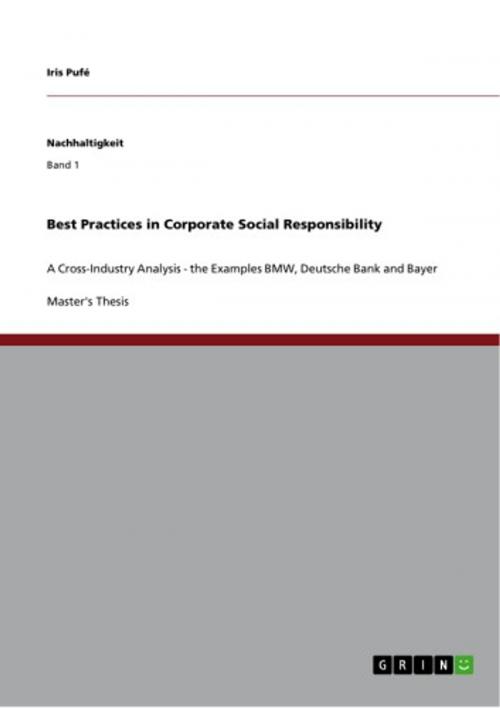Best Practices in Corporate Social Responsibility
A Cross-Industry Analysis - the Examples BMW, Deutsche Bank and Bayer
Business & Finance, Management & Leadership, Management| Author: | Iris Pufé | ISBN: | 9783656227496 |
| Publisher: | GRIN Verlag | Publication: | June 29, 2012 |
| Imprint: | GRIN Verlag | Language: | English |
| Author: | Iris Pufé |
| ISBN: | 9783656227496 |
| Publisher: | GRIN Verlag |
| Publication: | June 29, 2012 |
| Imprint: | GRIN Verlag |
| Language: | English |
Master's Thesis from the year 2010 in the subject Business economics - Business Management, Corporate Governance, grade: 1,6, University of applied sciences, Duisburg, course: Strategic Management, language: English, abstract: Companies engaging in CSR do better: they tend to benefit from lower costs, better reputation, more motivated employees, improved stakeholder relationships, in short a better performance, reputation and competitive advantage. The problem is: Most companies still do not know how to integrate CSR into their existing business processes and infrastructure. Some miss to select appropriate activities and instruments, others do not go far enough. The knowledge and insight from leaders and best practices in their field remain ignored. The study at hand seeks to verify the initially stated hypothesis. The purpose is to identify what CSR concept is suited for what industry and company as well as parallels and differences among industries regarding CSR strategy and their implementation. As enticing CSR appears as new key concept in business and management, there is little research and literature, in particular when looking at empirical cross-industrial analysis. The study at hand seeks to adress that black spot in CSR knowhow and theory by proceeding in four steps: First, the theoretical background and the concept of CSR is explained; second, the empirical resesarch and cross-industrial is conducted; third, based on the analysis an evaluation is made, results and conclusions are stated, and fourth a concrete recommendation in form of a CSR modell is given. The greater framework is given by explaining the theoretical background in form of concepts and models such as sustainability and triple-bottom line (TBL) since the CSR concept can be derived from the political arena that is transferred as a business ethics and compliance subject into the corporate/business context. By selecting best practices a cross-industrial analysis was conducted: With BMW as the leading brand in the currently technology-wise changing automotive sector, Deutsche Bank as strongly socially engaged big player with a fantastic yield-rate in the currently turbulent banking industry and Bayer as strongly subdivsioned and traditional performer in the pharmaceutical industry that is demographically seen said to be in a long-term upward trend. [...]
Master's Thesis from the year 2010 in the subject Business economics - Business Management, Corporate Governance, grade: 1,6, University of applied sciences, Duisburg, course: Strategic Management, language: English, abstract: Companies engaging in CSR do better: they tend to benefit from lower costs, better reputation, more motivated employees, improved stakeholder relationships, in short a better performance, reputation and competitive advantage. The problem is: Most companies still do not know how to integrate CSR into their existing business processes and infrastructure. Some miss to select appropriate activities and instruments, others do not go far enough. The knowledge and insight from leaders and best practices in their field remain ignored. The study at hand seeks to verify the initially stated hypothesis. The purpose is to identify what CSR concept is suited for what industry and company as well as parallels and differences among industries regarding CSR strategy and their implementation. As enticing CSR appears as new key concept in business and management, there is little research and literature, in particular when looking at empirical cross-industrial analysis. The study at hand seeks to adress that black spot in CSR knowhow and theory by proceeding in four steps: First, the theoretical background and the concept of CSR is explained; second, the empirical resesarch and cross-industrial is conducted; third, based on the analysis an evaluation is made, results and conclusions are stated, and fourth a concrete recommendation in form of a CSR modell is given. The greater framework is given by explaining the theoretical background in form of concepts and models such as sustainability and triple-bottom line (TBL) since the CSR concept can be derived from the political arena that is transferred as a business ethics and compliance subject into the corporate/business context. By selecting best practices a cross-industrial analysis was conducted: With BMW as the leading brand in the currently technology-wise changing automotive sector, Deutsche Bank as strongly socially engaged big player with a fantastic yield-rate in the currently turbulent banking industry and Bayer as strongly subdivsioned and traditional performer in the pharmaceutical industry that is demographically seen said to be in a long-term upward trend. [...]















